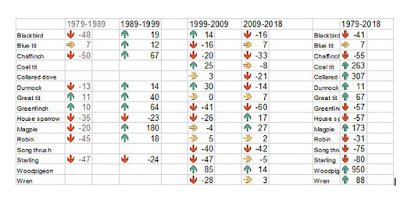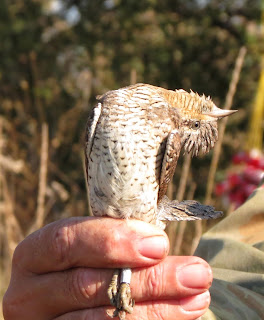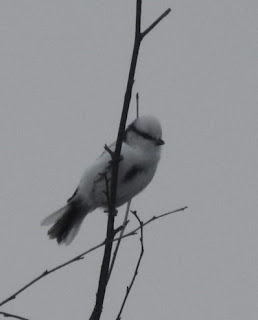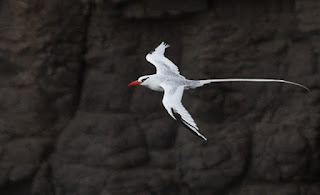RSPB Big Garden Birdwatch is 40! (26-28 January 2019)
·
The
RSPB is celebrating 40 years of its’ famous Big Garden Birdwatch.
· Over
8 million hours have been spent watching garden birds since the Birdwatch began
in 1979 with more than 130 million birds counted.
· To
mark the event, the RSPB is asking participants in Merseyside ‘How will you #BigGardenBirdWatch?’ and to
share their stories of how they take part.
·
Events
are taking place in Merseyside to help celebrate.
The
RSPB is eagerly anticipating who will be top of the pecking order for a very
special anniversary of its’ world famous Big Garden Birdwatch in January.
Just
one hour every year, for the last 40 years, has made the RSPB’s Big Garden
Birdwatch the largest garden wildlife citizen science project. During that
time, hundreds of thousands of people, including those across Merseyside, have
volunteered their time providing the RSPB with over 8 million hours of
monitoring garden birds.
To mark the event, the RSPB is encouraging
participants in the county to share their Big Garden Birdwatch stories on
social media. ‘How will you #BigGardenBirdWatch?’
will showcase some of the best examples of how people take part, from building
their own birdwatching den, baking birdseed cakes and dressing up as Batman to
see Robin.
This year’s Big Garden Birdwatch takes place
on 26, 27 and 28 January 2019. The public is asked to spend just one
hour watching and recording the birds in their garden or local green space,
then send their results to the RSPB. Close to half-a-million people join in the Birdwatch every year, with over
6,000 across Merseyside taking part in 2018.
To help
prepare for Big Garden Birdwatch 2019, there are events on offer across Merseyside
this January – from discovering how to attract more wildlife into your garden
to gaining tips on how to identify the creatures that live on your doorstep:
‘Get Ready for the Big Garden
Birdwatch’ will be held at RSPB Burton
Mere Wetlands nature reserve near Neston on Sunday 20 January. Drop-in from
1-3pm to make bird feeders, and the
knowledgeable team will also be on hand to assist with garden bird
identification to help you prepare for the birdwatch. Cost £2 per feeder, normal
entry fees apply to non-members visiting the reserve (RSPB members free), no
booking needed.
A
‘Big Garden Birdwatch quiz trail’ will also be taking place at Burton Mere Wetlands throughout the
month. Families are encouraged to take part in this self-led activity to
discover more about garden birds and how to take part in the Birdwatch. Cost £1
per quiz sheet, normal entry fees apply to non-members visiting the reserve
(RSPB members free), no booking needed. More details for both can be found at rspb.org.uk/burtonmerewetlands
Meet
the RSPB Liverpool Local Group in
the Palm House at Sefton Park, Liverpool
on Sunday 20 January. Volunteers will be on hand from 12-4pm with information
about taking part in the Big Garden Birdwatch, assisting with bird
identification and advising on how to attract garden wildlife.
Over
the last 40 years, 130 million birds have been counted giving the RSPB an
astonishing amount of insight into how our wildlife is faring.
For
four decades, Big Garden Birdwatch has highlighted the winners and losers in
the garden bird world. It was first to alert the RSPB to the decline in song
thrush numbers. The song thrush was a firm fixture in the top 10 in 1979. By
2009, its numbers were less than half those recorded in 1979, plummeting to 20th
in the rankings.
Mike Clarke, RSPB Chief Executive, said: “Everyone
has a role to play in saving nature and protecting our wildlife. Big Garden Birdwatch participants have made a
significant contribution to monitoring garden bird numbers over the past four
decades. Those taking part work together as part of a community with thousands of
other Big Garden Birdwatchers, to help the RSPB’s work to protect birds, other
wildlife and the places they live.
“Reaching
40 years is a huge achievement and shows just how passionate people across the
UK are about their wildlife. The survey
started as a winter activity for our youth members. It’s now the largest garden
wildlife survey in the world and appeals to both children and adults because
it’s an enjoyable, easy, inclusive activity that anyone can do, and a great
opportunity to connect with nature.”
The
survey has also shown the increases in collared dove and woodpigeon numbers and
the alarming declines of the house sparrow and starling. While the overall
decline in house sparrow numbers, reported by participants, since the Big
Garden Birdwatch began is 57% (1979 – 2018), in the most recent decade
(2009-2018) numbers appear to have increased by 17%.
As
well as counting birds, the RSPB is once again asking participants to log some
of the other wildlife they have seen throughout the year. This year, people are
being asked to look out for badgers, foxes, grey squirrels, red squirrels,
muntjac deer, roe deer, frogs and toads.
To take part in
the Big Garden Birdwatch 2019, watch the birds in your garden or local park for
one hour at some point over the three days. Only count the birds that land, not
those flying over. Send the RSPB the highest number of each bird species you
see at any one time – not the total you see in the hour.
For a FREE 40th anniversary Big
Garden Birdwatch pack, which includes a bird identification chart, plus RSPB
shop voucher and advice to help attract wildlife to your garden, text BIRD to
70030 or visit rspb.org.uk/birdwatch
The parallel event, RSPB Big Schools’
Birdwatch takes place during the first half of spring term (2 January – 22
February 2019). More than 60,000 schoolchildren, including over 670 in Merseyside,
spent an hour in nature counting birds in 2018. Further information can be
found at rspb.org.uk/schoolswatch
Long term trends – % change trends back to 1979 only available for 10
species and from 1999 to 2018 for 15 species.
3. While
the overall decline in house sparrow numbers, reported by participants, since
the BGBW began is 57% (1979 – 2018), in the most recent decade (2009-2018)
numbers appear to have increased by 17%. This is reflected in more standardised
national monitoring programmes (eg: BTO/JNCC/RSPB Breeding Bird Survey).
The
top 10 birds in 2018 RSPB Big Garden Birdwatch for Merseyside:
5.
In 2014, as a new part of Big Garden Birdwatch, the RSPB asked participants to
tell us about some of the other animals in their garden. This year we’re asking
people to look for: badger, fox, grey squirrel, red squirrel, muntjac deer, roe
deer, frog and toad. We’d like to know if any have visited their garden or
local park in the last year and, if so, how often.
6.









































